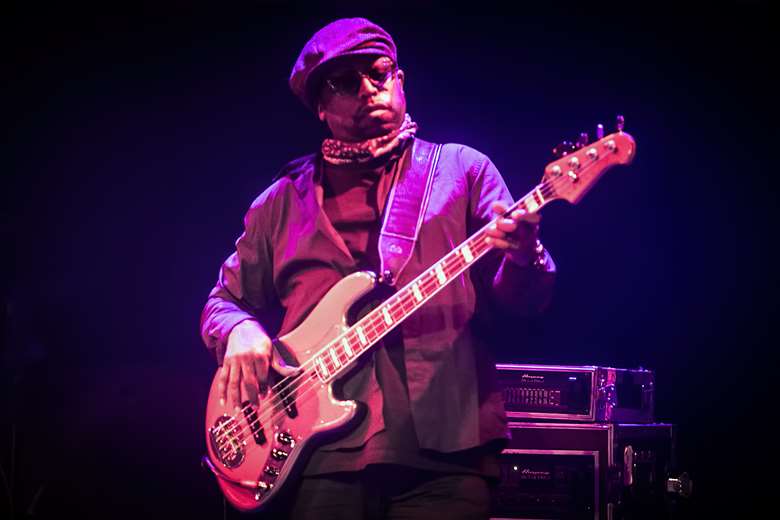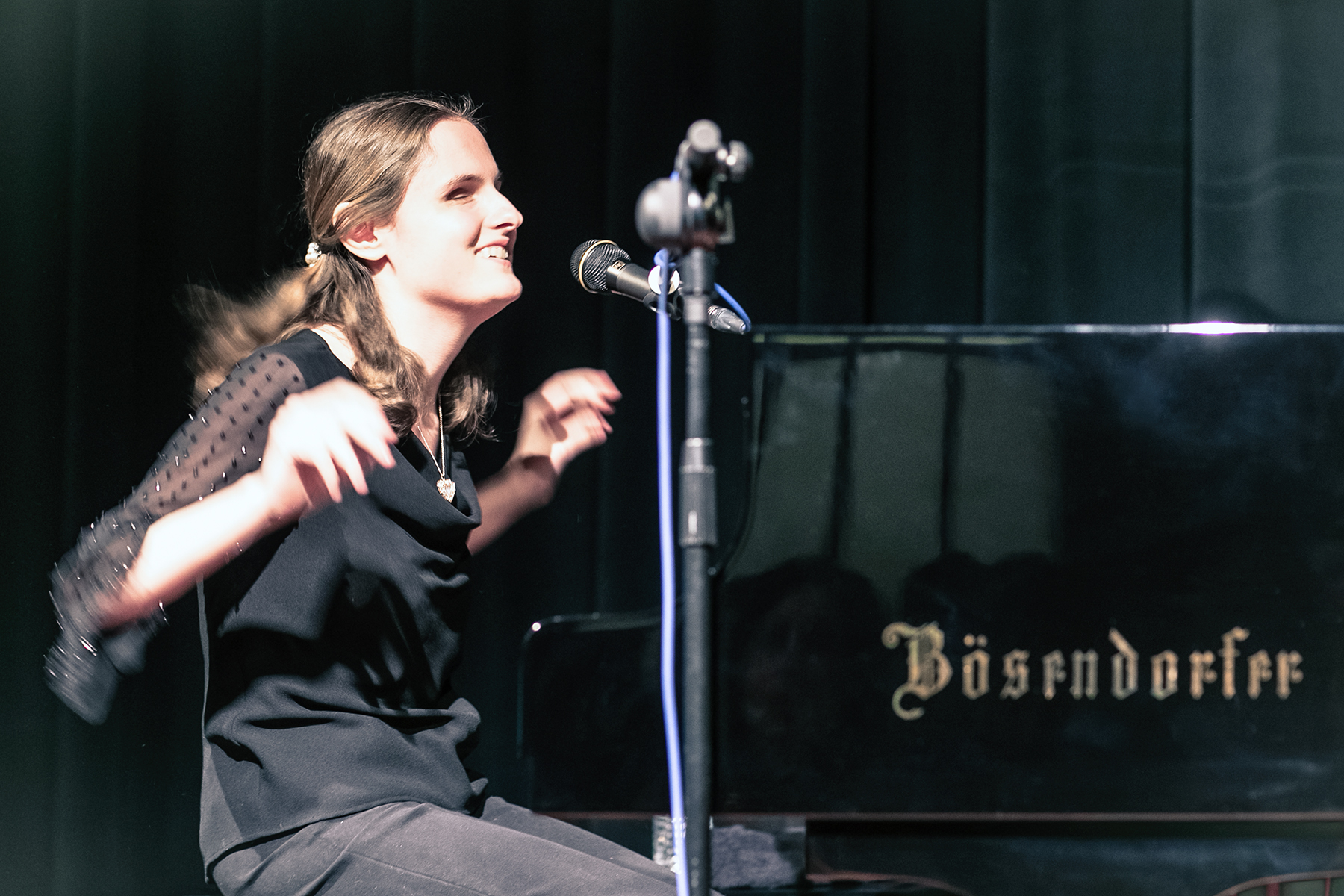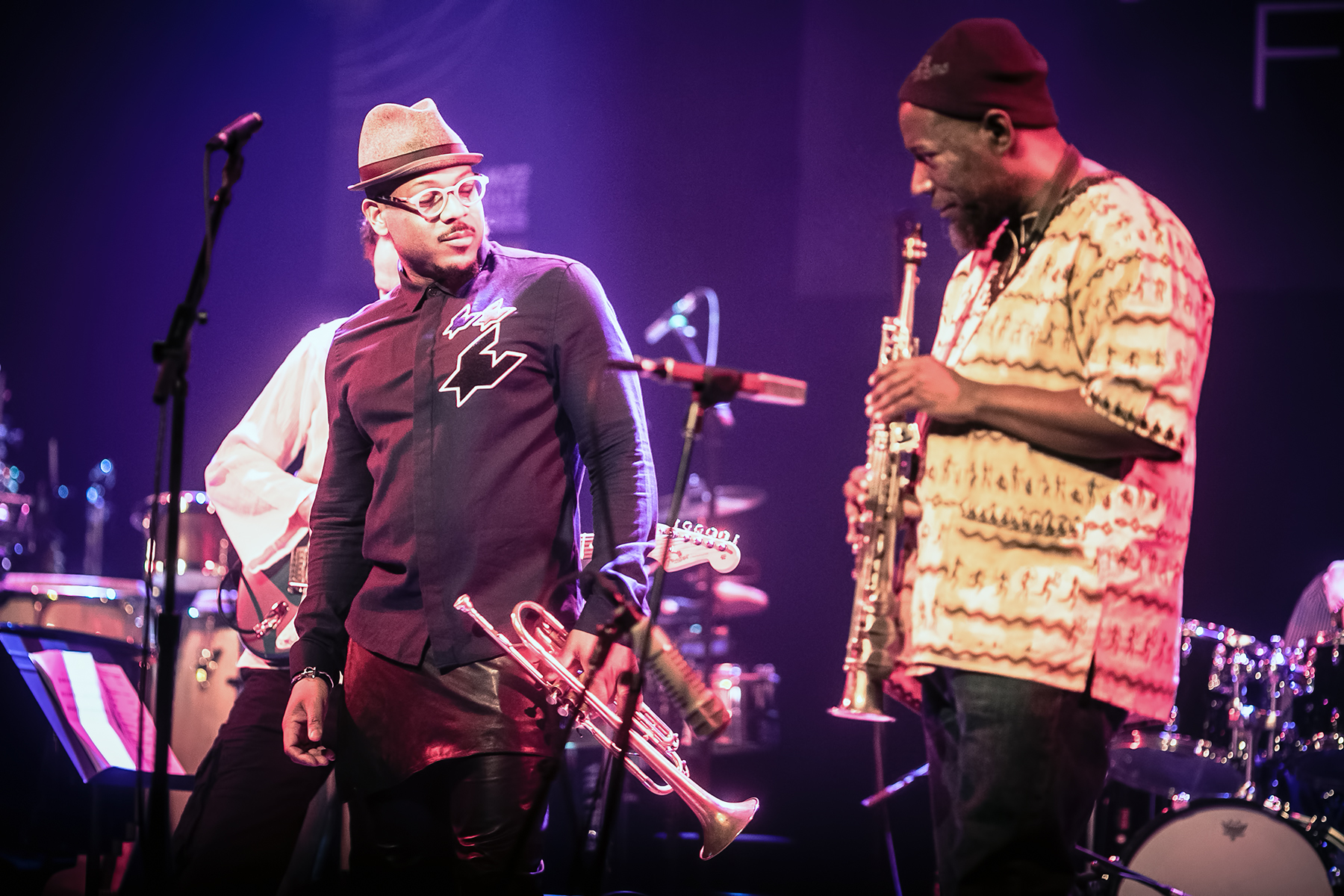All-Star Miles Electric Band powers-up 15th PDX Jazz Fest
Saturday, March 17, 2018
The last weekend of the 15th Portland Jazz Festival was a feast of jazz-rock/funk fusion, outstanding trumpets, guitars and piano jazz.

Pianist Marcus Roberts' trio with nimble drummer Jason Marsalis opened a double bill opposite Russell Malone's trio at the Newmark Theater. Roberts is a classically infused player and the first recipient of the Monk piano prize; he's impressed but failed to move me in the past with scholarly surveys of vintage jazz. After flights through the canon, including Monk (Blues Five Spot), Coltrane (Bessie's Blues) and Mingus (a romp through Haitian Fight Song including deft eights with Marsalis), it was his gossamer Naima, with its impressionistic flurries and emphasis on feeling over flash that won over.
Wearing a quizzical countenance, Malone scoured the audience as if figuring out who on earth they were. Despite introductory encomiums – quotes from Kurt Rosenwinkel about his smooth and connected concept – the guitarist phrased like a horn player who tongues, pecking notes like Sonny Rollins. His technique has subtleties amid the bravura and he can flip 180-degrees from mainstream machismo to delicate soliloquy. Such was the case with 'By the Time I Get to Phoenix', which Malone dedicated to boyhood hero Glen Campbell. The guitarist parsed Hank Marvin sans tremelo arm, bending the strings outrageously. During 'Lost in the Stars' Malone's micro tapping mimicked the firmament falling through God's fingers.
Malone announced the last tune when someone shouted "play some blues!" "Be careful what you say," he cautioned, "I'm from Georgia!" At that the band of Luke Sellick, Rick Germanson and Willie Jones III, launched into a filthy slow blues, the leader crossing the Delta via Jimmy Reed and Chuck Berry.
Later at the Winningstad Theater, enigmatic organist Dr Lonnie Smith commenced with his trademark slow build alongside Jonathans Kriesberg and Blake. Smith, 76, notwithstanding the whirring horns of the Leslie speaker, embraces technology: juxtaposing Hammond swells with laptop and samples of strings and Harmon-muted trumpet. The Miles-like gravitas of his horn simulation incorporates grace notes and tonal niceties, and with it he transcends the role of organ grinder. The exoticism of 'Alhambra', featured on his latest live release All in My Mind (Blue Note) owed a debt to Gil Evans' Sketches of Spain with its Korg-generated orchestral sweep. Few entertainers beguile, phantom of the opera-like, better than the Buffalo-born B3 boss. Gorgeously eloquent, Kreisberg sketched Paul Simon's 'Fitty (sic) Ways to Leave Your Lover,' ignited by Blake's lean second line beats and purring snare.

Classic Pianos, next door to the legendary Aladdin Theatre is a choice venue and it must have been a treat for multi-instrumentalist Rachel Flowers (above) to tickle a nine-foot Bösendorfer concert grand. Flowers, 23, also adeptly plays flute, guitar, Chapman Stick, ukulele – pretty much any instrument she touches. During a pre-show interview with festival director Don Lucoff, she enthused about guitar jams with Dweezil Zappa and her passion for the prog rock of Greg Lake. Other crushes included Rachmaninov, Kendrick Lamar and the Allman Brothers. Flowers was born fifteen weeks premature that led to blindness at three months; she's absorbed every sound around from her early get-go, much of it disarmingly retro. A fascination with Spinal Tap, a mockumentary released a decade before her birth, inspired 'Goes to Eleven', which features on the sweeping sampler of her talents Listen (2016). One composition was called 'Can't Stand Still' and Flowers hammered out 'Goes to Eleven' with apparent abandon tethered to precision. 'In the Middle of The Night' revealed that her mind rarely rests; after each focussed performance Flowers giggled, rocking back and forth ecstatically. There's scarcely a filter between her imagination and it's outpour but Flowers' expansiveness may prove hard to harness in a world where success is too often defined by stylistic restrictions.

The legacy of Miles Davis still looms large yet there didn't seem an excess of tributes on his 90th in 2016. His gregarious nephew Vince Wilburn Jnr has kept the flame high with an all-star Miles Electric Band, even with shifting personnel. He, stereo pianists John Beasely and Baabe Irving III, tabla master Debasish Chaudhuri, veteran percussionist Munyungo Jackson, Trinidadian trumpeter Etienne Charles and saxophonist Antoine Roney (above) convened at Revolution Hall. Intense, progressive guitarist David Gilmore stood in for sometime member Blackbyrd McKnight, or perhaps more appositely style-wise, Miles alum Mike Stern.
Anchoring the fun was moonlighting Rolling Stone Darryl 'The Munch' Jones (pictured top), who dropped those deep spongy basslines from Decoy and You're Under Arrest. It was Baabe Irving who nursed Miles back into the fray in the 1980s with The Man With the Horn and those synth stabs and galactic textures were instantly recognisable. When he'd be skeletal, Beasley would funk out on Rhodes stage right, then the spotlight would flip back to Irving who sketched 'Nerfertiti' and 'Seven Steps to Heaven', dusting Bill Evans' harmonies with arch nostalgia. The enveloping wallop of Joe Zawinul's anthemic riff from 'In A Silent Way' buoyed Roney's soprano and, sartorially snappy, Charles shot out volleys of chromaticism. Solo, Jones heralded the inevitable Jean Pierre but before that Jackson joined Chaudhuri front of stage for a cajón/tabla drum-off (pictured below). Badal Roy was the Indian percussionist most associated with Miles amidst his 1970s fusion along with Mtume, later Mino Cinelu, but Jackson and Chaudhuri were no disappointment. Jackson earlier announced 'dinner time!' with a triangle chime (then demonstrated how integral that humble item can be) and regaled with a chekere masterclass.

The MEB crowd was decent but the house for Snarky Puppy, an octet comparable in instrumentation and ethos, was sardine-like at Roseland Theater. Soul'd Out Music were the joint presenters and for those who can't spell they weren't kidding, you couldn't swing a cat in the joint, let alone a pissed off canine.
Regrettably a concert clash didn't allow absorption of much beyond Cory Henry's protracted synth melisma before belting to the Winningstad for Charles Tolliver and New Music Inc. I recalled the veteran trumpeter/arranger's take-no-prisoners orchestra at the 2007 IAJE, commemorated on the explosive With Love (Blue Note, 2006). The quartet in Portland was a different story. Attended by a sparse but hardcore following, bassist Devin Starks seemed diffident and guitarist John Thomas was slow to sift through his sheaf of charts. The leader, without music, waited for Thomas to settle; somehow he'd know when his fellow beret-sporting cohort was ready and then the music would kick in. Flavourful Tolliver originals made the bulk, save for a reprisal of Round Midnight (featured on With Love) and a raggedy take on Neil Hefti's 'Repetition,' popularized by Charlie Parker. Tolliver relishes a rough'n'ready, thriving on risk, though my ears were feeling bourgeois and eager for poised, less obtuse noteplay.
The following afternoon seamless mastery over challenging material (be careful what you wish for), was presented by charming guitarist Yotam Silberstein, who navigated serpentine Brazilian and Argentinean melodies, including Carlos Aguirre's 'Milonga Gris' and Jaco do Bandolim's 'O Vôo da mosca' (both feature on his superb quartet date The Village). Local hero Dan Balmer, himself an excellent guitarist, opened with funky organ combo Trio Subtonic and the Portland team seemed set to give the 36-year-old from Tel Aviv a run for his money. However the headliner brought his A game to the informal Mississippi Studios, a relaxed bar in Portland's historical district. Silberstein's quartet featured gangly Israeli drummer Daniel Dor, bassist Dave Robaire and the brilliant accordionist/pianist from Rio, Vitor Gonçalves, known for associations with Hermeto Pascoal and Maria Bethânia. Silberstein and Gonçalves played incredible duos together and the band had a blast negotiating Pixinguinha's fiendish soccer choro 'Um a zero.' Silberstein's fluid technique and dexterity are clearly his suit but his compositions reveal a reflective side, including the Blade Runner-esque 'Night Walk' inspired by after hours strolls in Tokyo.
More youthful virility was salient at Revolution Hall for the the final bill as 17-year-old drummer Domo Branch fronted his fiery 'Domo's Delight' featuring mentor Devin Phillips on tenor. Branch may have been the youngest in the band but the tight quintet recalled an incarnation of elder Art Blakey's Jazz Messengers.
In contrast, Javon Jackson, a past Messenger himself (1987-90), had nothing to prove since he had a red-eye to catch. Still looking much as he did in his Blakey heyday, Jackson, 52, helmed a veteran supergroup 'Jazz by 5', and demonstrated accrued wisdom with chiselled soloing, deploying false fingerings and split tones redolent of George Coleman. A Berklee college alumnus, Jackson cracked to pianist Joanne Brackeen (longtime faculty there), 'Berklee, that's where they teach triads isn't it?' Lanky Brackeen, in polka dot shirt, stripy socks and spangly gold sneakers looked brittle but played anything but, generating maximum applause with her rambunctious, investigative intelligence. Randy Brecker's gleaming tone telegraphed Miles-isms too, since the group embraced 'So What', 'Freddie the Freeloader' and 'Flamenco Sketches'. Was the setlist deferring to Jimmy Cobb, a cornerstone of Kind of Blue 60 years prior? A feisty drum feature on 'My Shining Hour' proved any Cobb concessions entirely unnecessary. These sagacious legends, including Eddie Gomez, may have shared some grey hair, but there their ability to iron wrinkles out of dyed-in-wool material was indubitable. A defiant climax to this savvy, smartly programmed festival, and Jazzwise caught only a fraction of the action.
Story and photos – Michael Jackson